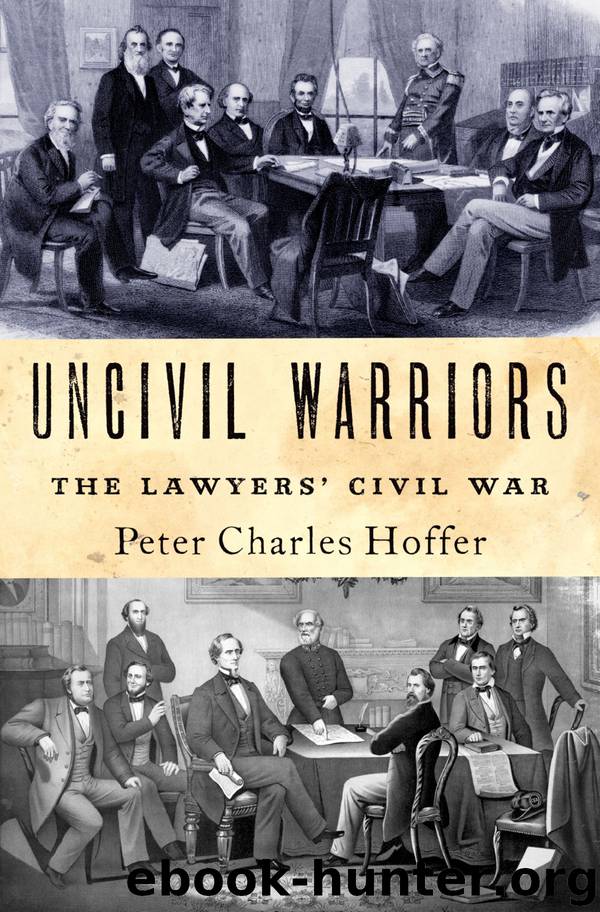Uncivil Warriors by Peter Hoffer

Author:Peter Hoffer
Language: eng
Format: epub
Publisher: Oxford University Press
Published: 2018-02-22T16:00:00+00:00
5
An Emancipation Proclamation
LINCOLN AND THE LAWYER/POLITICIANS in Washington, DC, with the exception of a handful of abolitionists in the Republican Party, had not at first regarded slavery as the crucial issue it would become. By contrast, from the outset of the war the abolitionists had seen in secession a way to end slavery. As lawyer, reformer, and fiery orator Wendell Phillips had told a Boston audience in December 1861, “Indeed, the only way, the only sure way, to break this Union, is to try to save it by protecting slavery.” They recognized that the protection of slavery was the reason Southerners voted for secession, but the purpose of the war was to suppress a domestic insurrection by the free population of the Confederacy. Still, because slavery was at the center of the controversy and because slaves could be found on or near every potential battlefield, the Civil War lawyers had to develop a policy to deal with it. While the majority of the Republicans were willing to pass confiscation acts and rescind the Fugitive Slave Act of 1850, they resisted anything as radical as the abolition of slavery. The press of events, however, would force their hand.1
Prior to the war, Benjamin Butler was a successful lawyer and politician in Massachusetts. He had no pronounced views on slavery itself, though by the 1850s he was a Free Soil Democrat and campaigned for Buchanan. Almost by accident he was one of the first of the lawyer/politicians to formulate a policy for the disposition of slaves. At the inception of hostilities, Butler commanded the Union forces on the James River’s Fort Monroe, across the Hampton Roads from Newport News, Virginia. To him came a number of slaves who rowed themselves across Mill Creek from the Confederate fortifications on which they had been working. At first, Butler was unsure of what to do with the escapees, and higher command offered little help. He believed that the “holding of slaves” was sanctioned by law, and he was not opposed to slavery in peacetime. He decided to regard the runaways as the contraband of war, in part because they were aiding the war effort of an enemy, in part because he needed their labor for his own fortification. It was a policy that was soon adopted by the Union in other theaters of the war and Congress included it in the First Confiscation Act of 1861.2
On August 3, 1862, a sweltering day in the capital relieved only the by promise of late afternoon rain, Lincoln summoned his cabinet. The mood was somber. General George McClellan’s Peninsula offensive had ended in failure and retreat. The war looked endless to Salmon Chase. Now was the time, he thought, to raise the question on all their minds—what to do about slavery. “I expressed my conviction for the tenth or twentieth time,” he recorded in his journal, “that the time for the suppression of the rebellion without interference with slavery had long passed.” His solution rested on the way in which the administration had chosen to wage the war.
Download
This site does not store any files on its server. We only index and link to content provided by other sites. Please contact the content providers to delete copyright contents if any and email us, we'll remove relevant links or contents immediately.
2010-The City & the City by China Miéville(1977)
Anatomy of Injustice by Raymond Bonner(1656)
That Every Man Be Armed by Stephen P. Halbrook(1576)
ADHD on Trial by Michael Gordon(1572)
Injustices by Ian Millhiser(1497)
You Don't Own Me by Orly Lobel(1443)
Tell by Major Margaret Witt(1437)
Course Correction by Ginny Gilder(1406)
Broken Scales by Joel Cohen(1348)
Without Copyrights by Spoo Robert(1346)
A Vast Conspiracy by Jeffrey Toobin(1327)
First by Evan Thomas(1280)
J by Howard Jacobson(1253)
A Religious Orgy in Tennessee by H.L. Mencken(1244)
The Run of His Life: The People v. O. J. Simpson by Jeffrey Toobin(1198)
A Triumph of Genius: Edwin Land, Polaroid, and the Kodak Patent War by Ronald K. Fierstein(1196)
A History Of Thailand by Baker Chris(1177)
John Wayne Gacy by Judge Sam Amirante(1110)
Law 101: Everything You Need to Know About American Law, Fourth Edition by Jay Feinman(1085)
